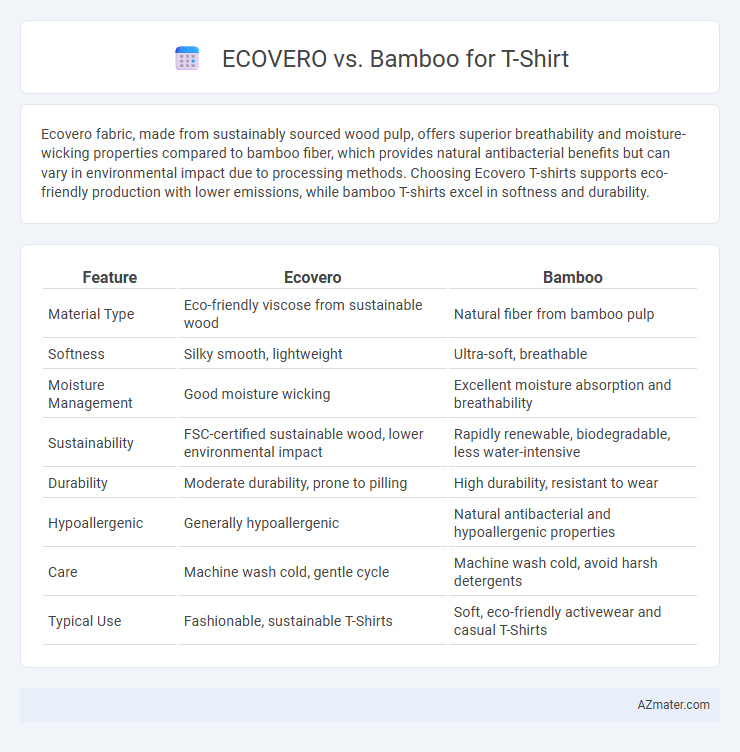Ecovero fabric, made from sustainably sourced wood pulp, offers superior breathability and moisture-wicking properties compared to bamboo fiber, which provides natural antibacterial benefits but can vary in environmental impact due to processing methods. Choosing Ecovero T-shirts supports eco-friendly production with lower emissions, while bamboo T-shirts excel in softness and durability.
Table of Comparison
| Feature | Ecovero | Bamboo |
|---|---|---|
| Material Type | Eco-friendly viscose from sustainable wood | Natural fiber from bamboo pulp |
| Softness | Silky smooth, lightweight | Ultra-soft, breathable |
| Moisture Management | Good moisture wicking | Excellent moisture absorption and breathability |
| Sustainability | FSC-certified sustainable wood, lower environmental impact | Rapidly renewable, biodegradable, less water-intensive |
| Durability | Moderate durability, prone to pilling | High durability, resistant to wear |
| Hypoallergenic | Generally hypoallergenic | Natural antibacterial and hypoallergenic properties |
| Care | Machine wash cold, gentle cycle | Machine wash cold, avoid harsh detergents |
| Typical Use | Fashionable, sustainable T-Shirts | Soft, eco-friendly activewear and casual T-Shirts |
Introduction to Ecovero and Bamboo Fabrics
Ecovero fabric is made from sustainably sourced wood pulp using environmentally responsible production processes that reduce water and energy consumption, making it an eco-friendly choice for t-shirts. Bamboo fabric, derived from bamboo plants, is naturally breathable, moisture-wicking, and has antimicrobial properties, offering comfort and durability in t-shirt applications. Both fabrics support sustainable fashion by combining eco-conscious materials with practical benefits for everyday wear.
Sustainability Comparison: Ecovero vs Bamboo
Ecovero fibers, derived from certified sustainable wood sources using eco-friendly production processes, offer lower water consumption and reduced greenhouse gas emissions compared to bamboo fabric, which often involves chemical-intensive treatments for softness and durability. Bamboo fibers, while naturally biodegradable and fast-growing, face challenges in sustainable cultivation practices and energy-intensive viscose processing methods that can impact environmental benefits. Both materials promote sustainability, but Ecovero's transparency in responsible sourcing and manufacturing typically results in a smaller overall ecological footprint for T-shirt production.
Environmental Impact of Ecovero and Bamboo
Ecovero fibers are produced from certified renewable wood sources using eco-responsible production processes that reduce emissions and water consumption by up to 50% compared to traditional viscose. Bamboo fabric, while naturally biodegradable and fast-growing, often involves intensive chemical processing that can harm ecosystems if not managed responsibly. Choosing Ecovero for T-shirts offers a lower environmental impact through certified sustainable forestry and cleaner manufacturing practices.
Production Process Differences
Ecovero fibers are derived from sustainably sourced wood pulp, produced through a closed-loop process that minimizes water usage and chemical waste, resulting in lower environmental impact during T-shirt manufacturing. Bamboo fibers for T-shirts often involve chemical-heavy processing methods such as viscose production, which can release harmful toxins and require more water, although mechanical bamboo linen production is more eco-friendly but less common. The primary production difference lies in Ecovero's certified sustainable sourcing and eco-efficient processing, whereas bamboo's environmental benefits depend heavily on the specific fiber extraction method used.
Comfort and Feel: Ecovero vs Bamboo T-Shirts
Ecovero T-shirts offer a silky smooth texture with excellent moisture-wicking properties, ensuring breathability and all-day comfort. Bamboo T-shirts are naturally soft and hypoallergenic, providing a lightweight and cooling feel ideal for sensitive skin. Both fabrics excel in comfort, but bamboo tends to have a richer, more luxurious softness, while Ecovero is favored for its durability and eco-friendly production.
Breathability and Moisture-Wicking Abilities
Ecovero fabric, derived from sustainable wood pulp, offers excellent breathability and moisture-wicking properties due to its semi-synthetic viscose composition, making it ideal for moisture management in T-shirts. Bamboo fabric naturally excels in breathability and moisture absorption, with inherent antimicrobial properties that enhance comfort and odor control during wear. Comparing both, bamboo often provides superior moisture-wicking and cooling effects, whereas Ecovero maintains balanced airflow with eco-friendly production advantages.
Durability and Longevity of Both Fabrics
Ecovero, made from sustainable viscose fibers, offers moderate durability with a smooth texture but may show signs of wear after repeated washing. Bamboo fabric, known for its natural strength and breathability, typically provides superior longevity and maintains shape better over time. Both fabrics are eco-friendly, yet bamboo stands out for extended durability in T-shirts subjected to frequent use.
Cost Analysis: Ecovero vs Bamboo T-Shirts
Ecovero T-shirts generally have a higher production cost compared to bamboo T-shirts due to the sustainable Viscose manufacturing process that emphasizes eco-friendly practices and certification requirements. Bamboo T-shirts tend to be more cost-effective because bamboo fabric production involves fewer processing steps and lower raw material expenses, resulting in cheaper retail prices. However, the price difference reflects variability in durability, eco-impact, and material sourcing, with Ecovero offering a premium sustainable choice versus bamboo's affordability and softness.
Style and Color Retention
Ecovero fabric exhibits superior style retention due to its smooth texture and high-quality finish, maintaining a crisp and vibrant look even after multiple washes. Bamboo fabric offers excellent color retention as its natural fibers absorb dyes deeply, resulting in rich, long-lasting hues. Both materials excel in durability, but Ecovero tends to preserve sharpness in style while bamboo enhances the intensity and longevity of colors.
Which Fabric is Best for T-Shirts?
Ecovero fabric, made from sustainably sourced wood pulp, offers breathability, moisture-wicking properties, and a soft, smooth texture ideal for T-shirts, while Bamboo fabric is known for its natural antibacterial qualities and exceptional softness with excellent temperature regulation. Ecovero provides better environmental benefits due to its eco-certified production process, whereas Bamboo requires specific processing that may involve chemicals unless certified organic. For T-shirts prioritizing sustainability and performance, Ecovero is often considered the superior choice over Bamboo, balancing comfort, durability, and eco-friendliness.

Infographic: Ecovero vs Bamboo for T-Shirt
 azmater.com
azmater.com